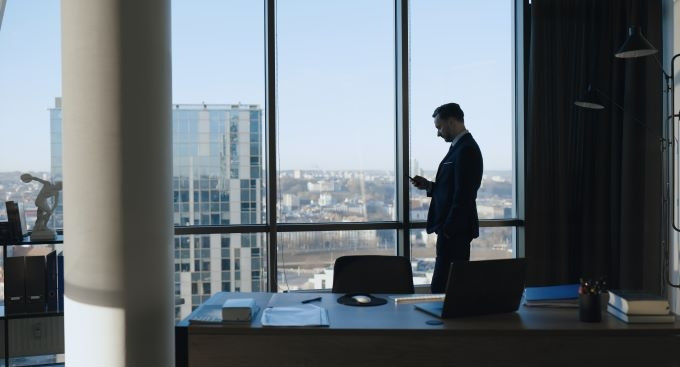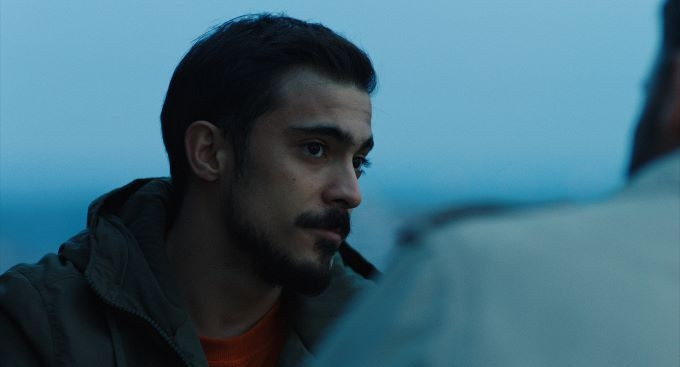“The Lawyer,” a compelling film from Lithuania, offers a rich tapestry of social commentary woven into a narrative of personal discovery and unexpected romance. Initially slated for its World Premiere at the prestigious BFI Flare Film Festival, this thought-provoking piece of cinema navigated the challenges of the global pandemic to reach audiences online, offering a preview screening that transcended geographical limitations. As part of BFI Flare at Home, “The Lawyer Film” emerged as a noteworthy example of contemporary filmmaking addressing pertinent social issues with artistic finesse.
Set against the backdrop of Vilnius, Lithuania, “The Lawyer” immediately immerses viewers in a society grappling with conservative norms, particularly concerning LGBT rights. In a country where gay marriage remains legally unrecognised, the film introduces Marius, the titular lawyer, a homosexual man navigating a seemingly paradoxical existence. Marius embodies professional success, residing in a stylish Vilnius apartment and thriving within a corporate law firm. His friends jokingly label his life “hetero-normative” due to his commitment to monogamy, hinting at the subtle yet pervasive societal expectations even within liberal circles.
 Eimutis Kvoščiauskas as Marius in The Lawyer
Eimutis Kvoščiauskas as Marius in The Lawyer
Marius’s lifestyle, characterized by wine-infused dinner parties and connections with art-world figures, paints a picture of bourgeois comfort. He is depicted as refined and sophisticated, often seen in sharp black suits, exuding charm and confidence. However, this polished facade contrasts with his private online interactions in internet chatrooms, engaging with men abroad via webcam. This duality subtly unveils a potential critique of class and desire, underscored by a friend’s observation that Marius seemingly prefers “working class men,” a statement that gains deeper resonance as the film progresses.
“The Lawyer film” takes a poignant turn as Marius confronts personal tragedy with the bereavement of a family member. This event acts as a catalyst, unearthing unresolved familial tensions and regrets. The film delicately suggests a possible history of disapproval towards Marius’s homosexual lifestyle, raising questions about potential ostracization and past wounds. While not explicitly stated, glimpses into his past life emerge as Marius attempts reconciliation with the deceased, employing close-ups and handheld camera work to convey his emotional turmoil and invite audience empathy. This juncture reveals Marius as a multi-layered character, subtly hinting at past prejudices or misunderstandings, perhaps even related to a transgender or bisexual character briefly introduced earlier in the narrative.
Further solidifying Marius’s humane side, “The Lawyer film” showcases his willingness to extend his legal expertise beyond corporate boundaries. He is seen assisting a friend with a family law case, despite it not being his area of specialization, and later leverages his skills to address a human rights issue. These acts of professional generosity challenge his initial corporate lawyer persona, adding depth to his character.
The narrative of “The Lawyer” smoothly transitions from Vilnius to Belgrade in its latter half, marking a significant shift in both location and thematic exploration. Belgrade becomes the physical meeting point with Ali, the man Marius connected with in the internet chatroom. Their online exchanges, memorably depicted with a striking pink hue, contrast sharply with the cold blue tones that envelop Marius’s spacious Vilnius apartment when he disconnects – a visual metaphor perhaps for the emotional warmth found in connection versus the isolation of his affluent life.
The film’s cinematography is consistently stylish, complemented by a smooth jazz soundtrack that acts as a non-diegetic undercurrent. This musical choice establishes a deliberate pace, allowing the narrative to unfold organically while simultaneously creating a hypnotic atmosphere. The music enhances the burgeoning romance between Marius and Ali, a classic “boy meets boy” trope set against the backdrop of Marius’s grief, amplified by the palpable chemistry between actors Eimutis Kvoščiauskas and Doğaç Yildiz.
“The Lawyer film” pivots towards political drama with the revelation of Ali’s status as a Syrian refugee. The film subtly addresses the profound impact of the Syrian war and the plight of political prisoners, offering a nuanced perspective distinct from powerful documentaries like “For Sama” and “The Cave.” Ali’s political circumstances elevate “The Lawyer” beyond a simple love story, grounding it in contemporary geopolitical realities.
Belgrade is portrayed as a city of stark, brutalist architecture, concrete high-rises forming a visual representation of Ali’s harsh reality. He spends his nights in a refugee camp, a stark reminder of the refugee crisis in Europe. However, the film deliberately keeps the refugee camp mostly off-screen, a stylistic choice that fosters a sense of equality between Marius and Ali. Ali himself resists being seen as a victim, pointedly highlighting the class divide between his situation and Marius’s privilege. This dynamic injects realism and complexity into their relationship, which initially felt somewhat unconvincing given their disparate backgrounds.
 Doğaç Yildiz as Ali in The Lawyer
Doğaç Yildiz as Ali in The Lawyer
“The Lawyer film” flirts with becoming a full-fledged political drama but ultimately treads a path between personal and political narratives. This ambiguity at times creates a sense of uncertainty in its direction.
The evolving dynamic between Marius and Ali is compelling as they navigate the bureaucratic obstacles to securing Ali’s freedom from the refugee camp. Their interactions with official organizations effectively illustrate the frustrations and systemic challenges faced by refugees. The film subtly raises questions about potential exploitation within their relationship. Is Marius, in his grief, potentially exploiting Ali, or is Ali leveraging Marius’s resources to improve his refugee status? This ambiguity adds layers of intrigue to their interactions.
Visually, “The Lawyer film” is striking, incorporating panoramic shots of docks with defocused boats, contrasting with Belgrade’s imposing architecture. Captivating spiral staircases and long-angle shots of buildings showcase the city’s intricate design and troubled history, acting as visual homages and symbolic representations.
Despite the often-bleak architectural landscape of Belgrade, “The Lawyer” finds beauty in unexpected places. Black and white interludes, showcasing floral designs, create pauses in the narrative, evoking documentary aesthetics or dreamlike sequences, adding to the film’s stylistic versatility.
“The Lawyer film” distinguishes itself by imbuing a sense of beauty and romance into the serious subject matter of Syrian refugees’ political status. Director Romas Zabarauskas’s sensitive approach, informed by his engagement with refugees at Krnjaca camp in Belgrade and the LGBT advocacy group Helem, lends authenticity to the portrayal.
As Zabarauskas’s third feature, “The Lawyer” is groundbreaking as the first Lithuanian film to depict a gay love scene between two men. This bold step challenges societal taboos in Lithuania and potentially opens dialogues on previously restricted topics.
Zabarauskas, known for his social activism, infuses “The Lawyer film” with these underlying principles. His apparent admiration for French cinema is evident in the film’s stylistic choices. This blend of French cinematic techniques and complex thematic explorations ensures that “The Lawyer” is not only visually appealing but also intellectually stimulating and emotionally resonant, making it a truly riveting cinematic experience.
The trailer for “The Lawyer” is available here.
Related posts:
Fingernails – London Film Festival 2023 – Film Review
Motherboard – London Film Festival 2024 – Film Review
Nosferatu: The Real Story – Film Review
